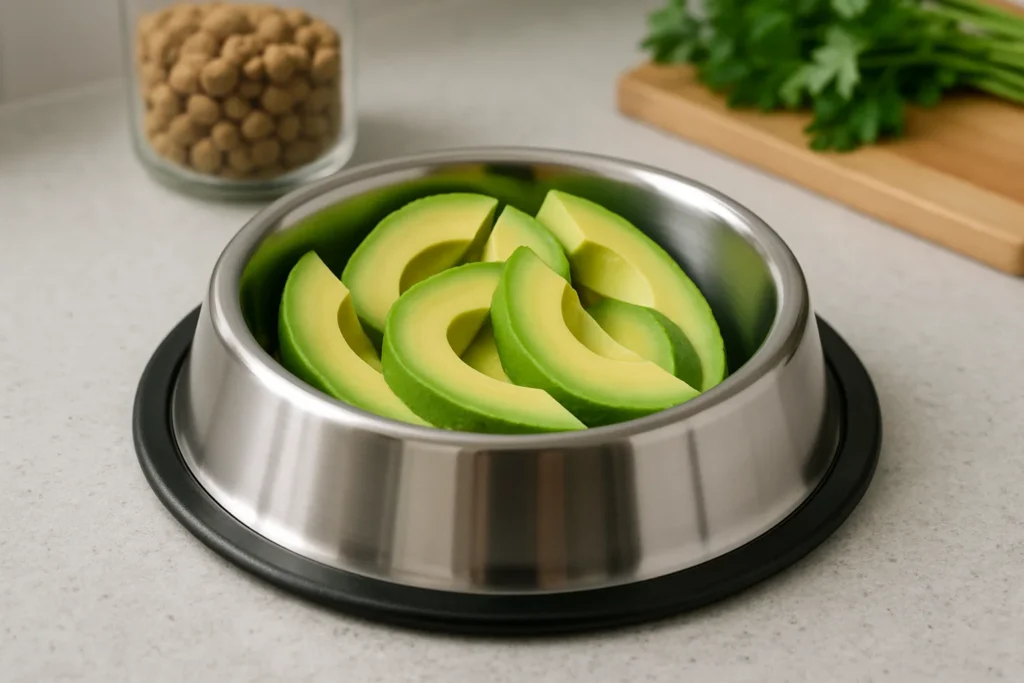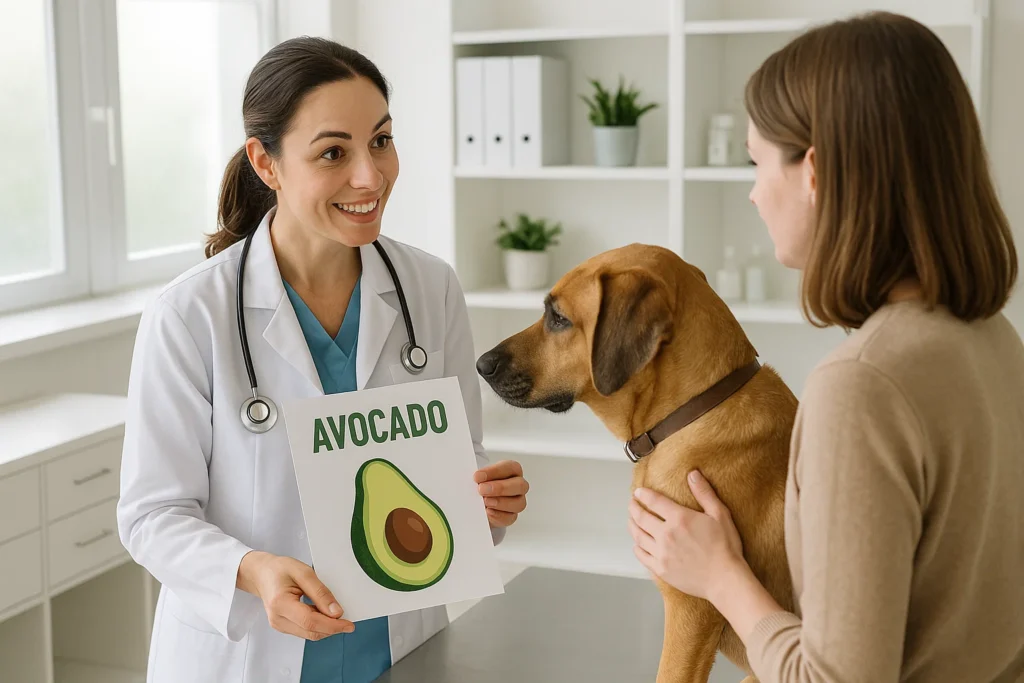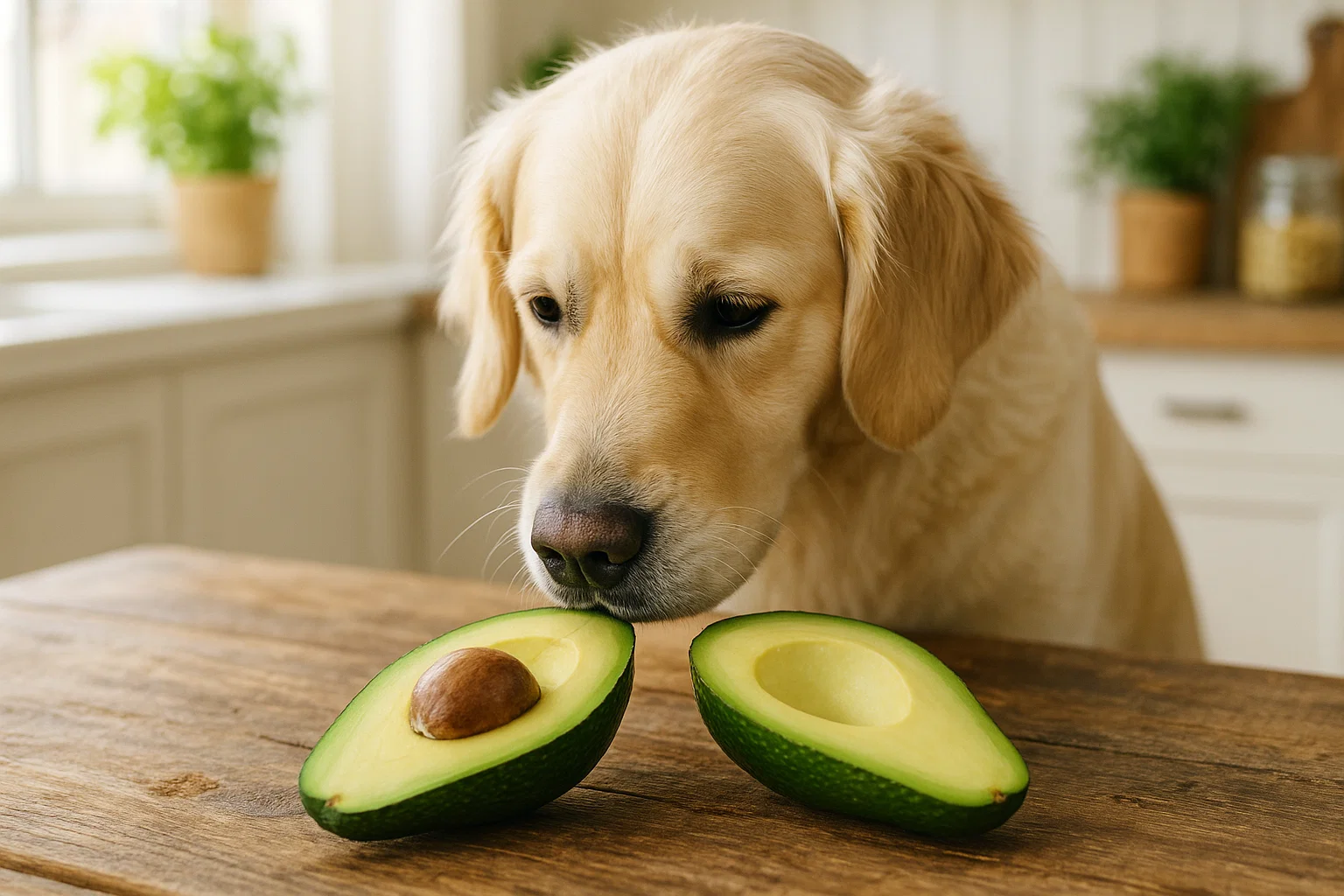
Avocados have become a favorite superfood in many American households. Rich in healthy fats, fiber, and essential nutrients, they’re widely praised for their benefits in human nutrition. But if you’re a dog owner, you might be asking yourself a very common question: can dogs eat avocado without risk?
The truth is, the answer isn’t as simple as yes or no. While avocado contains a compound called persin , which can be harmful to some animals , the level of risk for dogs depends on the part of the avocado, the amount consumed, and your dog’s size and sensitivity. Some owners give their dogs avocado in small amounts with no issue, while others avoid it entirely out of caution.
In this article, we’ll uncover 7 shocking but science-based facts that will help you decide whether this trendy fruit belongs in your dog’s bowl or not. From health benefits and hidden risks to safe feeding tips, you’ll get a clear picture of what’s safe and what’s not when it comes to dogs and avocado.
Is Avocado Safe or Toxic for Dogs?
Avocado may be a health booster for humans, but when it comes to dogs, the situation is more complicated. Many pet owners feel unsure about whether it’s safe to share even a small piece with their dog. To clear the confusion, it’s important to understand the specific components of the fruit, the natural toxin it contains, and what experts have to say. Let’s take a closer look.
What Is Persin and Why It Matters
One of the main concerns surrounding avocado and dogs is a compound called persin. This naturally occurring substance is found in the leaves, skin, and pit of the avocado and is known to be toxic to several animals, including birds, rabbits, and horses. But is avocado toxic to dogs because of persin?
In general, dogs are more resistant to persin than other species. According to veterinary studies, a healthy dog would have to consume a large amount of persin for it to be life-threatening. That said, persin can still cause mild to moderate gastrointestinal issues in sensitive dogs , including vomiting, diarrhea, or stomach discomfort , especially if they consume parts of the avocado that contain higher concentrations of the toxin.
Which Parts of the Avocado Are Dangerous?
The toxicity of avocado for dogs depends largely on which part of the fruit is consumed. Not all parts are created equal.
- The flesh (the soft green part we eat) contains very low levels of persin and is generally considered safe in small quantities.
- The skin holds higher concentrations of persin and can be difficult to digest. So, can dogs eat avocado skin? The answer is no , the peel should always be removed before offering avocado to your dog.
- The pit poses two dangers: it contains more persin and also presents a serious choking hazard or risk of intestinal blockage.
- The leaves of the avocado plant are highly toxic and should never be near your dog.
To minimize risk, only offer small portions of clean, ripe avocado flesh and avoid all other parts of the fruit.
Can Dogs Eat a Little Bit of Avocado?
In moderation, many healthy adult dogs can tolerate a small amount of plain avocado flesh without any serious problems. However, it’s crucial to monitor your dog after introducing avocado into their diet , even if it’s just a taste.
Symptoms of avocado poisoning in dogs may include:
- Vomiting
- Diarrhea
- Drooling
- Lethargy
- Difficulty breathing (in rare cases)
If your dog shows any of these signs after eating avocado, contact your veterinarian immediately. Puppies, small breeds, or dogs with existing health issues may be more vulnerable, so caution is advised.
What Vets Say About Avocado and Dogs
So, what’s the professional consensus? According to many veterinarians, avocado flesh can be safely fed to dogs in small amounts, but it’s not necessary for their diet and should be treated as an occasional treat , not a regular food item.
Some pet nutritionists even point out that avocado appears in commercial dog food in the form of avocado oil or meal, which are processed and purified to remove harmful elements. However, most experts still advise against giving dogs the raw skin, pit, or large quantities of flesh.
The bottom line is that avocado can be safe, but only if you understand the risks and serve it responsibly. When in doubt, always follow vet advice on avocado and dogs and keep treats in balance with your dog’s overall health and nutrition plan.
Health Benefits of Avocados for Dogs
While most of the discussion around avocados and dogs focuses on toxicity, it’s also worth exploring the potential health benefits of avocado for dogs , particularly when it’s served correctly and in moderation. Avocado flesh contains several nutrients that are beneficial to canine health, and some dog food manufacturers have even started to incorporate avocado extracts into their formulas. Let’s look at the nutritional side of this controversial fruit.

Nutrients Found in Avocado Flesh
The soft, green flesh of an avocado is packed with nutrients. While dogs don’t need avocado in their diet, small amounts of it can provide some notable health boosts.
One of the most important nutrients in avocado is omega-3 fatty acids, which are known to support brain function, reduce inflammation, and promote healthy skin and coat. Avocados also contain monounsaturated fats, which are heart-healthy and may help with weight management when used correctly.
Another benefit is the high fiber content, which supports digestion and can help regulate bowel movements. Fiber is especially important for dogs that struggle with constipation or irregular stools.
You’ll also find potassium, an essential electrolyte that helps with muscle function and nerve health. Additionally, avocados contain antioxidants like vitamin E and lutein, which may support immune health and protect against cell damage.
So while avocado should never be a main part of a dog’s diet, its nutrient profile shows why many consider it a potentially healthy addition when offered responsibly.
Avocado in Commercial Dog Food
The inclusion of avocado in dog food has sparked interest and controversy. Some premium pet food brands now include avocado oil or dried avocado meal in their recipes. These ingredients are processed to remove harmful compounds like persin, making them safe for dogs.
Avocado oil is rich in nutrients and easier to digest than raw avocado flesh. In dog food, it’s usually added in small, controlled amounts to enhance skin and coat health, support the immune system, and improve nutrient absorption.
If you notice avocado listed in your dog’s kibble or wet food, it’s usually a sign that the manufacturer is using a purified extract or oil, not raw chunks of the fruit. Still, many dog owners continue to ask: can dogs eat avocado in its natural form, or is it only safe in highly processed versions? It’s a good question , and one worth discussing with your veterinarian if you have concerns about specific ingredients in your dog’s food.
Avocado Oil vs. Whole Avocado
A common question among pet owners is: can dogs eat avocado oil instead of the whole fruit? The answer is yes , avocado oil is considered safer than raw avocado flesh because it contains little to no persin, especially when refined properly.
Avocado oil is often used in small doses to promote skin hydration, reduce inflammation, and add shine to the coat. It’s also more concentrated in beneficial fats and vitamins, and easier for most dogs to digest.
However, even with oil, moderation is key. Too much fat in any form can lead to weight gain or digestive upset, especially in dogs with sensitive stomachs. Always introduce avocado oil gradually and stick to vet-recommended quantities.
When Avocado Might Actually Help
Despite the warnings, there are some cases where avocado can be a smart treat. Dogs suffering from dry, flaky skin or a dull coat may benefit from the healthy fats and vitamin E found in avocado. The anti-inflammatory properties of its natural compounds may also help dogs with joint pain or arthritis.
Some pet owners report that occasional avocado treats help keep their dog’s coat shinier, skin softer, and digestion more regular. While these benefits aren’t a green light for daily feeding, they do highlight why some veterinarians see value in avocado when it’s offered safely and in small portions.
Risks and Warning Signs to Watch Out For
Even though avocado can offer health benefits in moderation, it’s not without its risks. Some dogs may react poorly to it, and others may face serious health complications depending on what part of the avocado they consume. Understanding these potential dangers is essential if you’re considering feeding avocado to your dog. Below are the most important risks and warning signs that every dog owner should be aware of.
Digestive Upset and Symptoms
The most common issue dogs experience after eating avocado is digestive upset. This usually occurs when a dog eats too much avocado flesh or consumes part of the fruit that contains higher levels of persin, like the peel or pit. For some dogs, even small amounts can lead to symptoms.
Symptoms of avocado poisoning in dogs may include:
- Vomiting
- Diarrhea
- Bloating
- Excessive gas
- Decreased appetite
- Lethargy
Avocados are rich in healthy fats. But too much fat — even the “good” kind — can be harmful to dogs. High-fat foods may trigger pancreatitis, a painful condition that causes inflammation of the pancreas. Dogs with sensitive stomachs, a history of pancreatitis, or weight issues are especially at risk. In these cases, the question can dogs eat avocado becomes even more important. Even small amounts may lead to serious digestive problems.
Choking and Intestinal Blockages
Beyond toxicity, the avocado pit is a major physical danger. It’s large, slippery, and difficult for dogs to chew. If swallowed, the pit can become lodged in the throat or gastrointestinal tract, causing choking or even a life-threatening intestinal blockage.
The skin of the avocado is also tough to digest and may irritate the stomach or get stuck in the intestines, especially in small dogs. While the flesh might be safe in small doses, the pit and peel should never be fed to dogs under any circumstance.
When we talk about safe human foods for dogs, it’s important to remember that even healthy fruits like avocado must be served carefully to prevent physical injury as well as digestive problems.
High Fat Content and Pancreatitis Risk
Avocados are rich in healthy fats, but too much fat , even the “good” kind , can be harmful to dogs. High-fat foods can trigger pancreatitis, a painful and potentially serious condition that causes inflammation of the pancreas. Dogs with sensitive stomachs, a history of pancreatitis, or existing weight problems are particularly vulnerable.
Signs of pancreatitis include:
- Repeated vomiting
- Abdominal pain or bloating
- Fever
- Loss of appetite
- Weakness
For dogs with these risk factors, even a small amount of avocado can cause a flare-up. If your dog is already on a low-fat diet or has a history of digestive problems, it’s best to avoid avocado completely.
Toxicity in Puppies and Small Breeds
Size matters when it comes to food safety. Puppies and small dog breeds are more susceptible to the effects of avocado because their bodies are smaller and less capable of processing certain compounds in high concentrations.
A piece of avocado that may be harmless for a large adult dog can lead to vomiting or worse in a Chihuahua or young puppy. Their narrower airways also increase the risk of choking on small chunks or pit fragments.
For this reason, puppies and toy breeds should not be given avocado unless approved by a veterinarian , and even then, the serving must be extremely small, soft, and carefully prepared.
How to Feed Avocado to Dogs (If at All)
If you’ve considered giving your dog a bite of avocado, it’s essential to do it the right way. While the flesh of the fruit can be safe in small amounts, proper preparation and portion control make all the difference. Here’s how to introduce avocado to your dog’s diet responsibly , if you choose to do so at all.
Start with Very Small Amounts
The safest way to begin is by offering a tiny piece of plain, ripe avocado flesh. Watch your dog closely for any unusual reactions such as vomiting, diarrhea, or lethargy. Every dog is different, and some may be more sensitive than others.
So, can dogs eat avocado flesh? Yes , but only in moderation. Start with no more than a teaspoon-sized portion and wait at least 24 hours to assess tolerance. If your dog shows no signs of discomfort, you may offer small amounts occasionally, but it should never become a regular snack.
To learn more about serving other dog-safe fruits in moderation, see our guide on can dogs eat cucumbers safely, which also covers feeding strategies and digestion tips.
Only Feed the Inner Flesh
It’s not just about how much avocado you feed , it’s also about which part. Only the soft green inner flesh should be considered safe. The skin is hard to digest and contains higher levels of persin, while the pit is not only toxic but a choking hazard.
And what about guacamole? Can dogs eat guacamole? Definitely not. Store-bought and homemade guacamole often contain ingredients that are toxic to dogs , including onion, garlic, lime, and salt. Even a small amount can lead to digestive upset or worse.
Stick to pure, unseasoned avocado flesh if you choose to share any at all.
Never Use Seasoned or Processed Avocados
Dogs should never consume avocado that has been cooked with other ingredients, seasoned, or added to dishes like salads, sandwiches, or sauces. Common seasonings like onion, garlic, and salt are all harmful to dogs and can cause serious health issues.
Additionally, processed avocado products may contain preservatives, oils, or artificial additives that upset your dog’s digestive system. Always use fresh, ripe avocado without any extras.
If you’re unsure about ingredients in a product or dish, it’s best to avoid it entirely.
Always Ask Your Vet First
When it comes to your dog’s diet, there’s no substitute for personalized advice. While some dogs tolerate avocado well in small amounts, others may have pre-existing health conditions that make it unsafe.
Your veterinarian knows your dog’s unique medical history, weight, digestion, and dietary needs. Before introducing any human food , especially one like avocado that carries some risks , be sure to get their opinion.
For a professional take on this subject, you can also visit PetMD’s veterinary guide on dogs and avocado, which breaks down the risks and recommendations clearly.
Conclusion
So, can dogs eat avocado? The answer is yes , but only with serious caution. Avocado is a unique food when it comes to canine nutrition. While it contains beneficial nutrients like healthy fats, fiber, and antioxidants, it also carries potential risks such as persin toxicity, choking hazards from the pit, and digestive upset from the skin or large quantities.
Let’s recap the 7 key facts every dog owner should know:
- Toxicity levels vary by part of the avocado : the flesh is least toxic, while the skin, pit, and leaves are more dangerous.
- Persin, a natural toxin in avocados, can cause vomiting or diarrhea in sensitive dogs.
- Only the inner green flesh should ever be offered to dogs : never the skin or pit.
- The nutrients in avocado, including omega-3s and potassium, can support skin and coat health.
- There are hidden dangers, including processed guacamole, high fat content, and choking risks.
- Avocado can be offered safely in tiny portions, with no added salt, spices, or ingredients.
- Most importantly, always follow vet guidance before adding avocado to your dog’s diet.
In short, avocado is not a must-have for dogs, but a small, well-prepared bite may be safe for healthy adult dogs who tolerate it well. Always introduce new foods slowly, monitor your dog’s reaction, and talk to your veterinarian if you have any doubts.
Your dog’s health is worth more than a trendy snack : so be informed, be cautious, and when in doubt, leave it out.

